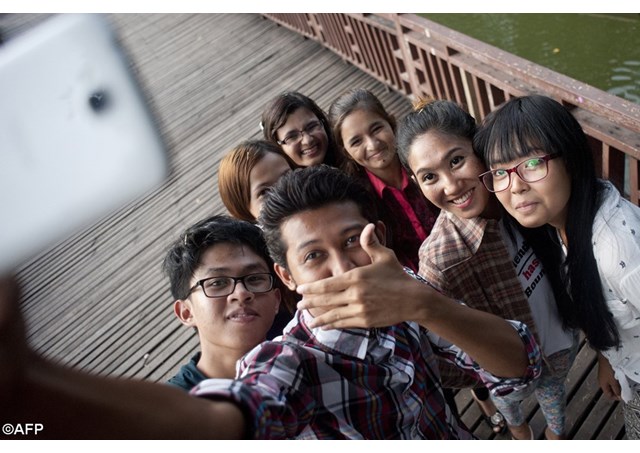
"My Friend" campaign to counter Myanmar’s anti-Rohingya violence

(Vatican Radio) A group of students in Myanmar have launched a social media selfie campaign to promote tolerance and fight hatred and violence between Muslims and Buddhists, amid a rash of hateful rhetoric and treatment of the Southeast Asian nation’s Muslim minority, a report said Sunday. Myanmar’s Buddhist majority has increasingly targeted Rohingya Muslims with violence in recent years and called for government officials to expel them from the nation’s borders.
This is especially noteworthy in a country that will go to the polls at the end of the year to elect a new parliament and president. In fact, as the elections approach, nationalist movements and extremist groups have flooded the political arena with words of hatred and attacks against the Rohingya minority.
To counter this, the promoters of the ‘My Friend’ campaign have begun posting multi-ethnic selfies on social media outlets like Twitter and Facebook, showing Buddhists and Muslims together. At first glance there is nothing unusual about the group of grinning teenagers jostling for space in front of a mobile phone camera. But their selfies are acts of unity in a nation hit by deadly recent outbreaks of communal violence and in a vitiated atmosphere of inflammatory hate speeches.
The goal is to show, especially to young people, that they can live in peace and harmony, irrespective of race, ethnicity or religious beliefs. The ‘My Friend’ campaign began on Facebook a few days ago and met with success with scores of likes. By Sunday, the group had received about 1,700 “likes” on Facebook.
“Everyone loves to take selfies in their own way, so why don’t we use it in a proper way, for the betterment of society?” said Wai Wai Nu, a member of Myanmar’s Rohingya Muslim population and one of the “My Friend” campaign’s co-founders. The group launched the campaign this summer in hopes of fostering momentum ahead of Myanman’s elections in November, when Buddhist nationalists were expected to continue inflammatory speech again the Rohingya. As the country prepares to head to the polls, campaign organisers hope their message of friendship gains traction.
As Han Seth Lu, a recent contributor to the campaign's Facebook page, put it in a post showing him standing alongside a woman in hijab: "I'm Buddhist and my friend is a Muslim."
"We are different but we accept each other," he added, "because friendship has no boundaries." Since the end of outright military rule, cheap mobile technology has ignited an Internet revolution in the former junta-run nation as it emerges from decades of isolation.
Many of Myanmar’s 1.3 million Muslims live in camps in the country’s Rakhine state. Myanmar’s anti-Rohingya movement has accused the nation’s Muslims of trying to supplant traditional Buddhist culture. Unrest between the two groups killed more than 200 people and displaced tens of thousands more in 2012.
Hardline Buddhist monks have led the anti-Muslim rhetoric through public demonstrations and online, sentiments matched by policy proposals many say target the minority. The most recent spate of protests in Yangon and western Rakhine state have railed against help being offered to desperate Rohingya Muslim migrants found adrift on boats in the Bay of Bengal.
Many Rohingya sought to escape persecution in Myanmar by emigrating Thailand. But the Thai government blocked the attempted exodus, leaving approximately 6,500 people trapped at sea.
Myanmar’s government has refused citizenship to most of its Muslim population and imposed sweeping restrictions that called for Myanmar to amend its citizenship policy, Al Jazeera reported.
At present, about 140,000 displaced people are living in refugee camps. According to Myanmar authorities, they have to accept to be classified as Bengali to obtain citizenship, or remain in camps where they are deprived of basic rights, including health care, education and work.
But the exponential growth in web access has also seen hate speech flourish on social media with many well-visited accounts operating anonymously. Blogger Nay Phone Latt is behind the Panzagar — or “Flower Speech” — movement which monitors and reports hate speech on sites like Facebook. He says the government is doing little to stop inflammatory content from spreading.
“There are some groups who are intentionally trying to spread hate speech, and trying to ignite violence,” he said, describing systematic online hate campaigns that are deeply intertwined with the country’s politics.
The “My Friend” selfie group, which operates on Facebook and Twitter, decided it would use the same technology to reduce those divisions. They were determined to launch the campaign before polls expected in November fearful that campaigning will deepen communal divisions.
The smiling subjects of the “My Friend” campaign on Facebook know they have a long way to go. Their campaign has garnered only around 1,700 likes on Facebook, a figure dwarfed by the more than 74,000 subscribers on Hardline Buddhist Monk Wirathu’s page. But they still hope their message of friendship gains traction as the country prepares to head to the polls.
As Han Seth Lu, a recent contributor to the campaign’s Facebook page, put it in a post showing him standing alongside a woman in hijab: “I’m Buddhist and my friend is a Muslim.”
“We are different but we accept each other,” he added. “Because friendship has no boundaries”.
Myanmar’s Catholic Church has spoken out on several occasions against the marginalisation and neglect faced by the Muslim minority.
(Source: AsiaNews, IBT, The Express Tribune)
| All the contents on this site are copyrighted ©. |


